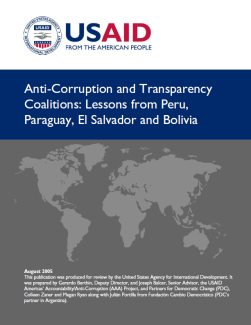Corruption is recognized as the most serious challenge to democratic and economic development today. Successfully tackling this widespread problem demands efforts that bring a number of actors together in a common cause to increase government accountability and transparency. Anti-corruption coalitions can, over time, mobilize the broad-based interests needed for an effective fight against corruption. Indeed, cooperation among groups with shared interests is an effective means to achieve goals as they combine resources, expertise and knowledge to mount an effort that is more powerful than can be achieved by one group acting alone.
USAID/AAA and its partners have consistently supported efforts to identify and replicate effective approaches for establishing anti-corruption coalitions in Latin America—joint efforts that build organizations’ capacity to work together to achieve results beyond what one CSO or NGO could accomplish on its own. Strengthening civil society oversight of government and disseminating lessons learned and best practices is one of USAID/AAA’s key areas of focus.
In this context, and at the request of the USAID/Bolivia mission, USAID/AAA sponsored a two-day international workshop on “Strategies for Building an Anti-Corruption Network,” in La Paz, Bolivia, 24-25 May 2005. The workshop was organized in close partnership with Partners for Democratic Change, a leading U.S. change and conflict management NGO with expertise in coalition building.

